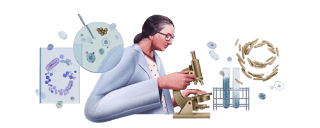Today, Google is honoring the Indian cell biologist Dr. Kamal Ranadive's 104th birthday with a doodle. Ranadive is noted for his revolutionary cancer research and for using science and education to create a fairer society. Ibrahim Rayintakath, an Indian guest artist, made today's doodle. "My main source of inspiration was 20th-century lab aesthetics and the microscopic world of cells related to leprosy and cancer," Rayintakath remarked of his motivation for today's doodle. In his doodle, Dr. Ranadive is looking through a microscope. Here is a brief info about Dr. Kamal Randive
Dr. Kamal Randive (Kamal Jayasing Ranadive, November 8, 1917 – April 11, 2001) was an Indian biomedical researcher who was well recognized for her cancer studies on the relationships between cancer and viruses. She was a founder member of the Indian Women Scientists' Association (IWSA), and it is a gift from that organization
At the Indian Cancer Research Centre in Mumbai in the 1960s, she developed India's first tissue culture research laboratory.
Kamal reported on research investigations on the "Comparative morphology of normal mammary glands of four strains of mice varied in their susceptibility to breast cancer" while working in the pathology department at Tata Memorial Cancer Hospital in Bombay (which later became Cancer Research Centre). In February 1945, she published a paper on breast cancer research that had gotten a lot of attention. She attempted to link the progression of the disease to factors such as inheritance, childbearing, histological structure, and others. She paid special attention to pediatric cancers of unknown origin and blood abnormalities known as dvscrasias.
In 1982, Kamal received the Padma Bhushan (India's third highest civilian award) for his contributions to medicine. She received the Medical Council of India's first Silver Jubilee Research Award in 1964. A gold medal and a cash prize of $15,000 were included in this award. She also received the G. J. Watumull Foundation Prize in Microbiology in 1964.
She was an Indian Council of Medical Research Emeritus Medical Scientist (ICMR).



0 Comments
Leave your comments